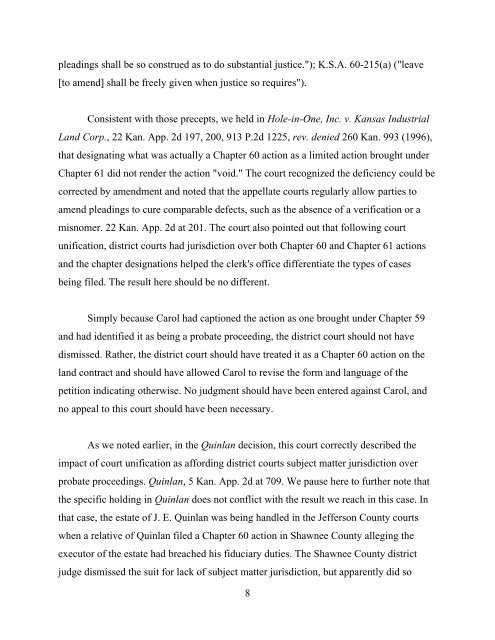103047 - Kansas Judicial Branch
103047 - Kansas Judicial Branch
103047 - Kansas Judicial Branch
You also want an ePaper? Increase the reach of your titles
YUMPU automatically turns print PDFs into web optimized ePapers that Google loves.
pleadings shall be so construed as to do substantial justice."); K.S.A. 60-215(a) ("leave<br />
[to amend] shall be freely given when justice so requires").<br />
Consistent with those precepts, we held in Hole-in-One, Inc. v. <strong>Kansas</strong> Industrial<br />
Land Corp., 22 Kan. App. 2d 197, 200, 913 P.2d 1225, rev. denied 260 Kan. 993 (1996),<br />
that designating what was actually a Chapter 60 action as a limited action brought under<br />
Chapter 61 did not render the action "void." The court recognized the deficiency could be<br />
corrected by amendment and noted that the appellate courts regularly allow parties to<br />
amend pleadings to cure comparable defects, such as the absence of a verification or a<br />
misnomer. 22 Kan. App. 2d at 201. The court also pointed out that following court<br />
unification, district courts had jurisdiction over both Chapter 60 and Chapter 61 actions<br />
and the chapter designations helped the clerk's office differentiate the types of cases<br />
being filed. The result here should be no different.<br />
Simply because Carol had captioned the action as one brought under Chapter 59<br />
and had identified it as being a probate proceeding, the district court should not have<br />
dismissed. Rather, the district court should have treated it as a Chapter 60 action on the<br />
land contract and should have allowed Carol to revise the form and language of the<br />
petition indicating otherwise. No judgment should have been entered against Carol, and<br />
no appeal to this court should have been necessary.<br />
As we noted earlier, in the Quinlan decision, this court correctly described the<br />
impact of court unification as affording district courts subject matter jurisdiction over<br />
probate proceedings. Quinlan, 5 Kan. App. 2d at 709. We pause here to further note that<br />
the specific holding in Quinlan does not conflict with the result we reach in this case. In<br />
that case, the estate of J. E. Quinlan was being handled in the Jefferson County courts<br />
when a relative of Quinlan filed a Chapter 60 action in Shawnee County alleging the<br />
executor of the estate had breached his fiduciary duties. The Shawnee County district<br />
judge dismissed the suit for lack of subject matter jurisdiction, but apparently did so<br />
8

















